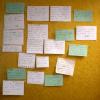Related Content
 |
On Your Software Team, Who Should Own Automation? There is a prevalent question in the software world these days: Who should be working on automation—developers or testers? Justin Rohrman says it can be everyone's responsibility. It’s more important to look at the structure of your technical team, what skill sets are available, and what the skill distribution is. |
|
 |
The Subtle Art of Diplomatic Communication with Project Sponsors It’s an art to balance project sponsors’ need for timely and accurate information with being diplomatic in how and when that information is delivered. Diplomacy is about tact—communicating in tough situations without antagonizing anyone more than necessary. Here are eight keys to diplomatic, effective communication. |
|
 |
How You Can Help the Human Animals in Your Group Thrive On our teams, we deal with many individuals with diverse perspectives. It's not always easy, but we are animals, and many animals live and work—and are only able to survive—in teams. You can look to how animals interact with and react to each other to see how we, as human animals, can not just survive, but thrive. |
|
 |
Transforming Your QA and Test Team Testing professionals are essential to the success of technology projects. Delivering better, faster, and at a lower cost is not solely done with automation and development teams—testing professionals are here to stay and grow. But we have to fight for our place, and that means evolving with industry requirements. |
|
 |
To Sound Intelligent and Articulate, Enunciate as You Speak If people have to guess what you’re saying, they may discount even your best ideas. If you can’t tell whether you’re pronouncing and enunciating your words well, record your presentation practice sessions or read a few paragraphs from a book to monitor the clarity of your speech. Your listeners will thank you. |
|
 |
What’s in the Fall 2017 Issue of Better Software Magazine Better Software magazine editor Ken Whitaker highlights content from the latest issue, including articles on bridging the divide between agile and waterfall, scaling agile through empowered teams, DevOps and IoT, and continuous development. |
|
 |
Balance Technical and Social Skills for Project Success Software testing is a socio-technical undertaking, which means that effective test strategies must incorporate a balance of technical capabilities relating to processes and tools and social capabilities used for communication and problem-solving. This balance enables true project success. |
|
 |
Use Continuous Backlog Grooming to Refine Agile Requirements Continuous backlog grooming means systematically refining your user stories: breaking up larger stories, obtaining detailed requirements, writing the requirements in terms of acceptance criteria and acceptance tests, and sharing and refining these details with the team. Acceptance test-driven development can help. |








